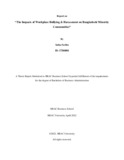The impacts of workplace bullying & harassment on Bangladeshi minority communities
Abstract
The negative repercussions of workplace bullying will be highlighted in this paper, which includes absences, reduced productivity, frustration, emotional problems, and fatalities. Bullying, hatefulness, taunting, mistreatment, and abuse against women have become widespread throughout the years and must be addressed. Bullying can vary from trivial acts such as unpleasant manners and harsh behavior to more serious types of torment in which one weak person demeans, insults, or coerces another by putting someone and getting her on edge. Bullying affects the productivity between the supervisor or a person in charge and his subordinates, as well as between subordinates. It takes numerous forms, causing mental stress, inefficiency, the loss of gifted resources, and hurting the targeted individual's self-esteem. Many organizations have measures in place to combat bullying, but it is difficult to detect bullying since bullies cleverly operate within the organization's limits. This thesis/study will investigate and comprehend the notion of workplace bullying, as well as the factors that contribute to this conduct. It is critical for employers to stop professional bullies as root in order to promote a safer and healthier environment in the long run. The paper will go on to discuss the main importance for dealing with the workplace bullying of minorities in Bangladesh. Overall, this article will provide a comprehensive overview of the notion of harassment in the workplace and its influence on Bangladeshi minorities.

